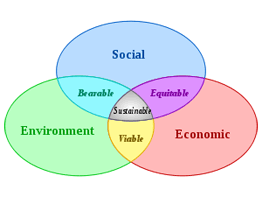





About Sustainable Development
DEFINITION
"Sustainable development is development that meets the needs of the present without compromising the ability of future generations to meet their own needs." Our Common Future: The Brundtland Report for the United Nations, 1987.
DIAGRAM
Simplified, sustainable development can be summed up as follows:

Sustainable developement is principly founded on the integrated functioning of the pillars of economy, environment and the social realm. Nonetheless, this integrated functioning prioritizes the pillar’s elements in the following fashion:
The social and the human aspects are "the objectives": "Equity, solidarity, social and cultural diversity, for human betterment."
Environment means, "the ecological demand": "The conservation of ecosystems and the controlled management of resources". Limiting discharges into the biosphere and preserving air, water, ground and subsoil, biodiversity along with the resources of nature and countryside.
Economic means, "The efficiency of the economic tool": "The viable management of the production-consumption of goods and services." The economy is an instrument to serve man and not the other way around.
In order to better integrate these three pillars, a new decision-making method becomes necessary. This is the democratic process, which is the accepted form of government nowadays. Governing in such a way is, "the method, the new way things are done." : The democratic management of the citizen, participating in the decision-making process and its ethics. The way things are done is as important as what is being done. Sustainable development cannot be decreed, it must be constructed.
CONCLUSION
Sustainable development calls us to fundamentally change the way we THINK, PRODUCE, CONSUME and MAKE DECISIONS.
